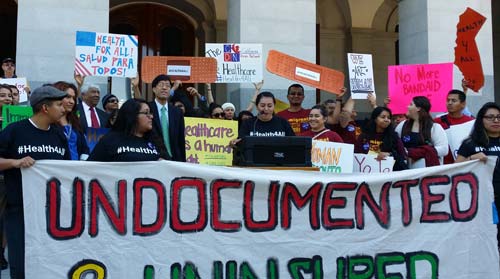One-third of undocumented Californians earn enough to buy their own health insurance on the federal exchange, but Uncle Sam won’t let them, asserted Sen. Ricardo Lara, D-Bell Gardens. That’s forcing them to make the costly decision to go to emergency rooms when their health deteriorates.
“Allowing them to pay for their insurance makes economic sense and is the right thing to do,” said Lara, as he explained why he introduced SB 4 – otherwise known as the Health for All bill – during a May 11 tele-conference call with ethnic media.
Lara said the bill, introduced earlier this year, would give undocumented immigrants the option of buying insurance through Covered California, the marketplace exchange set up under the ACA. That is something the 2010 Affordable Care Act (ACA) denied them. Good as the ACA is, the senator pointed out, by barring undocumented immigrants from benefiting from it the federal government has “completely failed.”
Around 24 ethnic media outlets were on the New America Media-sponsored hour-long call, along with 28 health care advocates and stakeholders.
Health Access California’s executive director Anthony Wright, the other panelist on the call, who has been at the forefront of efforts to get the bill before the legislature, pointed out the stark reality of being uninsured: “You live sicker, die younger and are one emergency away from financial ruin.”
Doreena Wong, project director for the Los Angeles chapter of the Asian American Center for Advancing Justice, shared her insights on how the Health for All bill will help the state’s approximately 210,000 undocumented Asian Americans.
SB 4, now “on suspense” in the Senate Appropriations Committee (a status every bill that costs $150,000 or more is put on until all the other bills are considered) will allow all California residents to get coverage, regardless of their immigration status. It will allow residents, who meet other eligibility requirements, to enroll in Medi-Cal (known as Medicaid in the rest of the nation), the health insurance program for low-income people.
The bill will also allow those who make too much money to qualify for Medi-Cal – up to about $16,240-a-year for an individual and $33,465 for a family of four – to buy insurance under Covered California.
If SB 4 passes, Lara said, the state would seek a waiver from the federal government to allow its undocumented residents to buy on the exchange.
If, however, the federal government denies the waiver, he said, the bill will allow the state to set up a “mirror” marketplace that sells insurance plans identical to those offered through Covered California.
In either case, though, unlike legal residents who do receive federal assistance through the exchange, no subsidies will be provided to undocumented immigrants who enroll. This is a departure from Lara’s 2014 Health for All bill, SB 1005.
That bill stalled in the Senate Appropriations Committee because of its estimated cost. According to researchers at the University of California at Berkeley and University of California in Los Angeles, expanding Medi-Cal to undocumented California residents would have cost the state between $353 and $369 million in 2015, representing a 2 percent increase in state spending on Medi-Cal. An analysis by the committee pegged the cost of subsidizing insurance purchased on the marketplace at between $20 million and $40 million a year.
Since no subsidies will be offered through SB 4, the cost will be significantly less. Additionally, if President Obama’s 2014 executive action giving temporary deportation relief for undocumented immigrants is upheld, the cost of SB 4 could drop by about $100 to $300 million a year, Wright pointed out. That’s because many of the 500,000 undocumented immigrants in California – the bulk of whom are under 45 – could enter the workforce and get employer-sponsored health insurance.
Wright noted that it would be a relatively “small financial investment” by the state to cover its undocumented residents. Of the 12 million California residents who are currently on the Medi-Cal rolls, “many are in the Emergency Medi-Cal program” for undocumented residents. That program allows them to seek hospital care only for pregnancy-related issues or for emergencies.
According to the California Immigrant Policy Center, it would cost only an additional two cents for every dollar the state currently spends on its Emergency Medi-Cal patients to provide them full-scope Medi-Cal.
Wright said the “momentum” the state has built by passing AB 60, which allows undocumented immigrants to get a driver’s license, and the Trust Act, which passed in 2013 limiting the state’s cooperation with federal immigration authorities when local law enforcement authorities apprehend an undocumented person, will more than likely carry SB 4 to the governor’s desk.
He pointed out that as undocumented immigrants are financially contributing to California’s economy – $130 billion annually to its gross domestic product and $2.2 million in state taxes, according to Lara – “they need to be included in our health care system.”
“We are better off if our health care system is stronger and everybody is included in it,” Wright said.
If SB 4 gets out of the Senate Appropriations Committee, it will come up for a vote before the full Senate some time between June 1 and 5 after which it moves to the assembly.
